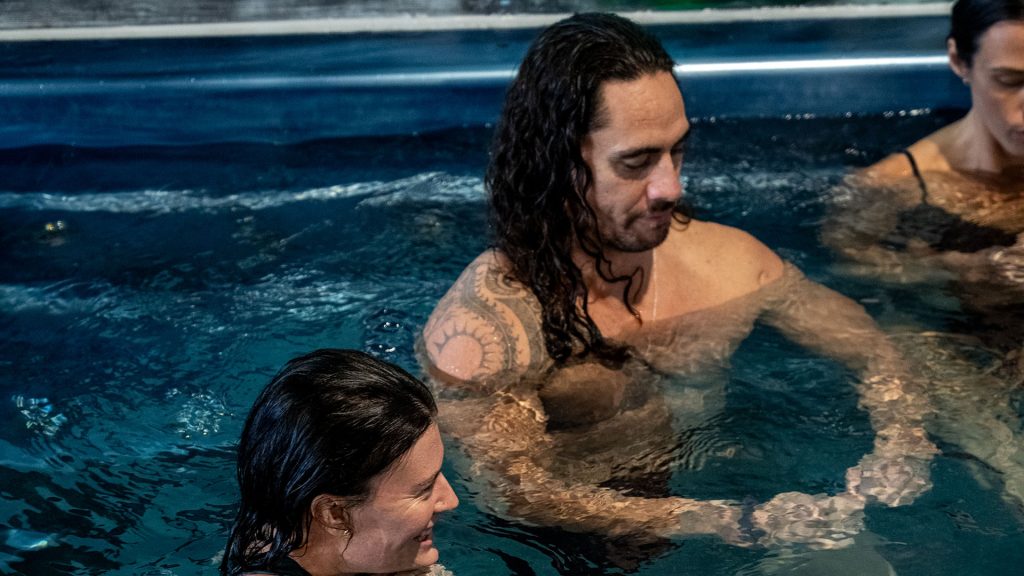How Bath Meditation Can Accelerate the Physical Recovery Process

The Benefits of Bath Meditation in Recovery
In an era marked by relentless schedules and increasing demands, individuals are continually seeking out ways to foster their well-being, particularly in terms of physical recovery from daily stresses and strain. Bath meditation presents an accessible yet profound method to soothe both the body and mind. This process involves transforming your bathing ritual into a sensory sanctuary, where the warmth of the water envelops you, allowing for both physical relaxation and mental rejuvenation.
One of the primary benefits of this practice is stress reduction. Engaging in bath meditation allows for a moment of pause, enabling the nervous system to relax fully. Stress is known to impede recovery, slowing healing processes and negatively impacting overall health. A soothing bath can significantly lower cortisol levels, the hormone responsible for stress, creating an atmosphere where healing can thrive.
- Muscle Relief: The warm water acts as a natural remedy for muscle tension, aiding in the relief of soreness. When submerged in warm water, the body’s temperature rises, stimulating circulation and promoting the delivery of oxygen and nutrients to fatigued muscles. This can be especially beneficial after a vigorous workout or long day of physical labor.
- Mental Clarity: The practice of mindfulness during bath meditation encourages a state of mental tranquility. This provides a chance to focus on deep breathing and positive visualization, key factors that are essential for mental recovery. Studies have shown that mindfulness meditation can enhance focus and clarity, reducing anxiety levels that often accompany physical discomfort.
Research supports the notion that the combination of meditation and physical therapy can yield significantly improved recovery outcomes. Bath meditation integrates mindfulness seamlessly into an already familiar routine, making it easier for individuals to incorporate this beneficial practice into their lives. By tuning into bodily sensations and the rhythm of the breath, practitioners may discover deeper relaxation and a heightened sense of body awareness that accelerates their recovery journey.
Historically, bathing has served not only as a means of hygiene but also as a social and spiritual practice across different cultures. From the ancient Roman bathhouses to Japanese onsens, the ritual of bathing has long been regarded as a place for healing and rejuvenation. In contemporary times, this ancient technique is being revived through the lens of modern wellness, proving that the essential art of self-care holds profound relevance.
To delve deeper into the transformative effects of bath meditation, consider exploring how essential oils and natural herbs can enhance this practice. Lavender, for example, is renowned for its calming properties, perfect for inducing restfulness during your bathing rituals. Ultimately, incorporating bath meditation into your recovery routine may not only help you recover physically but also lead to an enriched state of overall well-being, opening paths to a healthier and more balanced life.

DISCOVER MORE: Click here to dive deeper
Unlocking the Healing Power of Bath Meditation
Bath meditation is more than just a trend; it represents a powerful fusion of relaxation and mindfulness that can catalyze the physical recovery process. Individuals recovering from intense fitness regimes, injuries, or simply the rigors of daily life may find that this meditative approach to bathing offers a myriad of benefits that extend beyond the surface. As the body sinks into the warm water, the simultaneous act of meditation fosters a healing environment where physical and mental restoration can occur.
At the heart of bath meditation lies the concept of immersive mindfulness. As you fully engage with the sensations experienced in the bath— the gentle embrace of warm water, the soothing sounds of water softly sloshing, or the fragrant aroma of essential oils—you’re creating a space for deep relaxation. This level of immersion can significantly lower heart rates and calm the mind, allowing the body to shift away from a stress response that often hinders recovery.
- Enhanced Circulation: The warmth of the bath encourages blood vessels to dilate, which can enhance circulation throughout the body. Improved blood flow delivers essential nutrients needed for cell repair and replenishment, promoting a quicker recovery from physical exertion or injury.
- Detoxification: Immersion in warm water allows the body to sweat, aiding in the elimination of toxins. Bath meditation often features the inclusion of Epsom salts or herbal remedies that can help to draw impurities from the body, further enhancing the detoxification process and paving the way for greater overall health.
- Joint Relief: For those recovering from joint pain or injury, the buoyancy of water reduces pressure on joints, allowing for pain-free movement. This gentle exercise can help maintain mobility while encouraging the healing process.
Numerous studies have highlighted the benefits of integrating mindfulness techniques into recovery routines, and bath meditation offers a unique opportunity to do just that. Research has indicated that focused mindfulness practices can lead to lower levels of anxiety, a significant factor when coping with pain or physical limitations. The act of focusing on the present moment during bath meditation fosters a sense of control over one’s healing process, allowing individuals to navigate their recovery journey with greater ease.
As we examine how bath meditation can accelerate physical recovery, it becomes essential to acknowledge the historical significance of bathing as a healing practice across cultures. Ancient civilizations recognized the therapeutic value of warm baths, and modern wellness practices are only catching up to what our ancestors already understood. By embracing this timeless ritual, individuals can cultivate a supportive environment that fosters restoration both physically and mentally.
As you explore the incorporation of bath meditation into your recovery protocol, consider pairing it with mindful breathing or guided visualization techniques to deepen the experience. With each bath, you may find that you’re not simply washing away the day’s stress, but also harnessing the restorative powers of water to enhance your recovery process.
| Advantage | Description |
|---|---|
| Enhanced Circulation | Bath meditation promotes blood flow, which is crucial for delivering nutrients and oxygen to recovering muscles. |
| Stress Reduction | Using bath meditation techniques helps to lower levels of cortisol, the stress hormone that can impede healing and prolong recovery times. |
The practice of bath meditation significantly influences the body’s healing mechanisms. Enhanced circulation is vital as it efficiently brings oxygen and essential nutrients to the injured areas, thus speeding up the recovery process. Furthermore, the act itself acts as a meditative practice, helping individuals to focus inward, release tension, and alleviate stress. This practice can overhaul not just the mental state but also physical recovery, making it a complementary solution for athletes or anyone recovering from injuries. Additionally, by fostering a tranquil environment, bath meditation encourages deeper relaxation, allowing the body to undergo its natural healing processes without the distraction of daily stressors. In essence, bath meditation serves as a unique and valuable ally in the journey towards physical recovery.
DIVE DEEPER: Click here to discover the soothing sounds
The Science Behind Bath Meditation and Recovery
Diving deeper into the physical aspects of bath meditation, we find an intricate interplay between relaxation and physiological healing. Recent research supports the notion that warm baths can influence muscle recovery significantly. For instance, exposure to heat—much like a warm compress—has been shown to decrease muscle soreness and stiffness, facilitating faster recovery from exercise-induced muscle damage. The soothing heat increases the body’s metabolic activity, promoting the repair of microtears in muscles caused by intense workouts.
Additionally, the combination of warm water and meditation induces a state of profound relaxation that triggers the release of endorphins. These “feel-good” hormones can reduce perceptions of pain and improve overall mood, which is incredibly beneficial for those dealing with injuries. As mental well-being often correlates with physical health, harnessing the empowering effects of endorphins can have a profound impact on one’s recovery trajectory.
Another critical component of bath meditation is its impact on sleep quality. Studies have consistently found that taking a warm bath before bedtime can contribute to better sleep patterns. This is particularly significant for recovery, as sleep is known to be one of the most vital components of the healing process. The relaxation experienced during bath meditation can contribute to falling asleep faster and enjoying deeper, more restorative sleep cycles—actions crucial for tissue repair and recovery.
Additionally, a consistent bath meditation practice can support mental focus and resilience. Engaging in guided meditation or using techniques such as visualization can create a strong mental framework for healing. Athletes and rehabilitation patients who incorporate mental imagery into their recovery routines often report increased motivation and the ability to visualize successful outcomes, leading to reduced anxiety about their progress. This psychological advantage cannot be underestimated, as mental barriers often impede the physical recovery process.
Another interesting aspect to consider is the social dimension of bathing rituals. In many cultures, soaking in communal bathhouses fosters a sense of community, support, and shared healing experiences. Such interactions can effectively relieve feelings of isolation often associated with injury recovery. The synergy of social connection and bath meditation might enhance the overall recovery experience. Research indicates that individuals who engage in social support during recovery tend to have improved outcomes, further emphasizing the importance of a holistic approach.
Bathtub meditation proponents may further refine their experience by introducing aromatherapy. Essential oils such as lavender, eucalyptus, and chamomile not only enhance the sensory experience but also bring various therapeutic benefits. For example, lavender oil is renowned for its calming properties, potentially providing additional support for anxiety reduction. Experimenting with courses or combinations of essential oils can create a personalized self-care ritual, optimizing recovery times.
Finally, integrating elements of hydrotherapy—one of the oldest forms of medicine—into your bath meditation routine can enhance results further. Alternating temperatures, such as incorporating cool baths or alternating with hot baths, can stimulate blood flow and invigorate muscles, promoting quicker recovery times. This practice can be a valuable tool for balancing relaxation with muscle stimulation and rejuvenation.
DISCOVER MORE: Click here to dive deeper
Embracing Bath Meditation for Holistic Recovery
In conclusion, bath meditation emerges as a powerful tool that not only promotes relaxation but also significantly enhances the physical recovery process. By combining the therapeutic benefits of warm water with mindfulness practices, individuals can harness the physiological effects of heat to reduce muscle soreness and increase metabolic activity, ultimately promoting faster healing from workouts and injuries alike.
The role of endorphins in lifting mood and alleviating pain cannot be overstated, as these hormones contribute to an overall sense of well-being that is vital during recovery. Furthermore, the crucial relationship between sleep quality and healing underscores the importance of incorporating a nightly bath meditation ritual. Improved sleep translates into better tissue repair, making this an essential practice for athletes and anyone recovering from physical strain.
Mental resilience gained through visualization and focused meditation techniques also plays a critical role in overcoming psychological barriers to recovery. As individuals build a supportive framework around their healing journey, the integration of social connections and community experiences during bathing can foster a nurturing environment that enhances recovery outcomes.
Lastly, by exploring elements like aromatherapy and hydrotherapy, enthusiasts can personalize their bath meditation routines, further optimizing their physical healing efforts. In a world increasingly aware of the importance of holistic health, embracing bath meditation may be an innovative step towards achieving a more complete recovery. As research continues to reveal the profound benefits of this practice, it invites us to delve deeper and explore the myriad ways mindful bathing can rejuvenate both body and mind.



